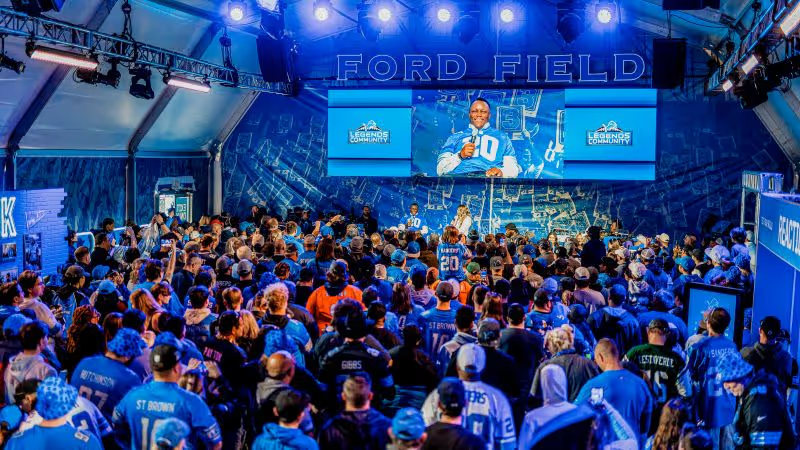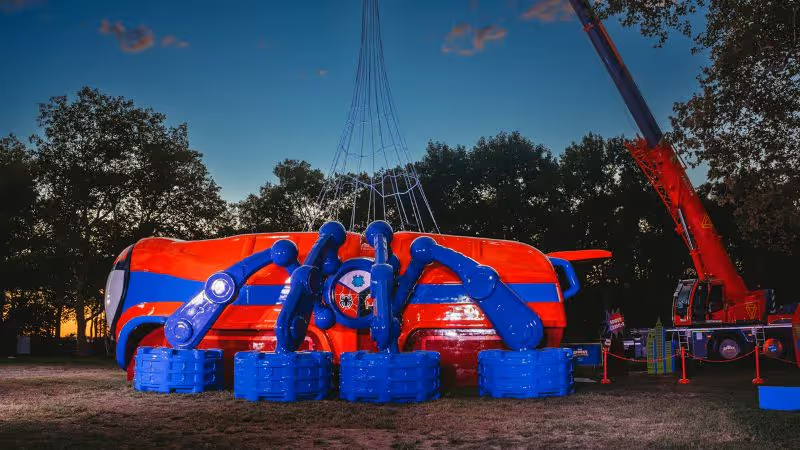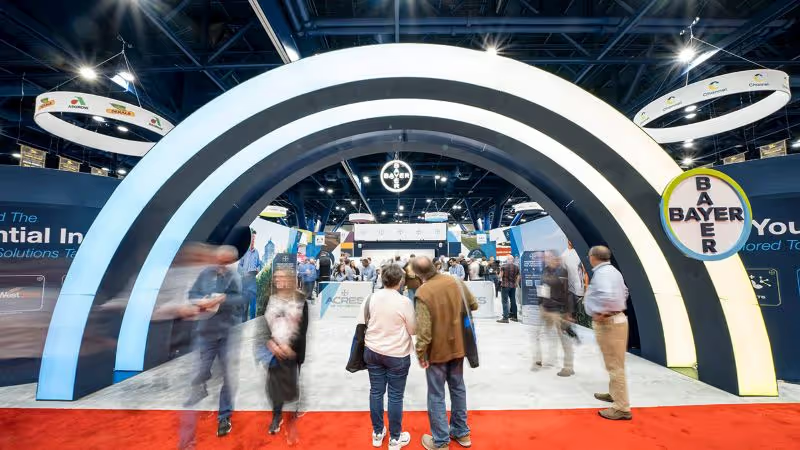Why Business Brand Events Outperform Traditional Marketing
What happens when consumers can skip your ads, block your emails, and scroll past your social media posts? Many companies are finding that live brand events create connections that digital marketing struggles to match. These experiences transform passive audiences into active participants, allowing brands to demonstrate value through hands-on interaction rather than promotional messaging.
Live brand activations deliver measurable results through direct consumer interaction, immediate feedback collection, and the creation of lasting impressions. Companies can track lead generation, measure conversion rates, and build brand awareness while participants enjoy engaging experiences that leave positive associations with the brand. The following sections explore why experiential marketing has become a foundation of successful business strategies and how to execute events that provide real business impact.
Why Business Brand Events Are Essential for Modern Companies
Marketing departments across industries are recognizing the power of experiential strategies that create direct connections with their target audiences. Live brand events offer opportunities for meaningful engagement that traditional marketing methods cannot replicate.
Breaking Through Digital Saturation
Personal interactions at corporate events create trust and credibility that digital channels struggle to achieve. When consumers can speak directly with brand representatives, ask questions, and experience products firsthand, they develop stronger emotional connections to the brand. This human element transforms transactional relationships into lasting partnerships that drive long-term customer value.
Corporate brand events create shared experiences that participants remember long after the event concludes. These memories become associated with positive brand impressions, increasing the likelihood of future purchases and referrals.
Building Lasting Brand Loyalty
Event experiences provide natural opportunities for social sharing, extending brand reach through organic word-of-mouth marketing. When participants share their event experiences on social media, they become brand advocates who influence their networks through authentic testimonials rather than paid advertising.
Delivering Measurable Business Impact
Professional event planning includes clear objective setting and performance measurement systems that track return on investment. Companies can measure:
- Lead generation and conversion rates
- Brand awareness lift through pre- and post-event surveys
- Social media engagement and reach expansion
- Customer acquisition costs compared to other channels
- Long-term customer value and retention rates
The immediate feedback available at live events allows for real-time optimization and relationship building that digital marketing cannot match. Sales teams can qualify leads instantly, adjust messaging based on participant responses, and identify market opportunities through direct consumer interaction.
Core Types of Business Brand Events That Drive Results
The most effective business brand events share common characteristics: they create direct engagement opportunities, provide value to participants, and align with specific business objectives. Companies can choose from several proven event formats, each designed to achieve different marketing goals and reach distinct audience segments.
Success depends on matching the right event type to your target audience and business objectives. Some events work better for product launches, while others excel at building industry relationships or expanding market reach. Understanding these differences helps companies invest their marketing budgets in events that deliver the strongest return on investment.
Live Brand Activations
Live brand activations transform product launches and marketing campaigns into immersive experiences that engage target audiences through multiple touchpoints. These events often feature interactive product demonstrations, entertainment elements, and branded environments that create memorable brand encounters.
Product launches become celebration moments rather than simple announcements, generating excitement that translates into increased sales and brand awareness. Press activation events work particularly well for introducing new products or services because they allow potential customers to interact with offerings before making purchase decisions.
Mobile Brand Tours
Mobile brand tours bring corporate experiences directly to target audiences across multiple markets, eliminating geographic barriers to brand engagement. These mobile interactive experiences typically feature custom-designed vehicles or trailers that create branded environments in parking lots, festivals, and high-traffic areas.
Key advantages of mobile tours include:
- Reaching diverse demographics across multiple cities
- Maintaining consistent brand messaging across markets
- Cost-effective market expansion without permanent locations
- Flexibility to target seasonal opportunities and events
- Ability to test new markets before major investments
Corporate Networking Events
Corporate networking events create opportunities for business-to-business relationship building through structured interaction opportunities. These events range from intimate VIP experiences for high-value clients to large industry gatherings that showcase company expertise.
The professional atmosphere of these events attracts decision-makers who have the authority to make purchasing decisions. Industry-specific networking events position companies as thought leaders while providing platforms for showcasing products and services to qualified prospects.
Interactive Trade Shows and Pop-ups
Interactive trade shows and pop-up events provide temporary retail environments where consumers can experience products and services firsthand. These events often feature product demonstrations, sampling opportunities, and immediate purchase options that convert interest into sales.
The limited-time nature of pop-up events creates urgency that motivates immediate action. Trade show participation allows companies to showcase their offerings alongside competitors while demonstrating superiority through direct comparison.
Key Elements of Successful Business Brand Events
Professional event execution requires the coordination of multiple elements that work together to create memorable experiences and drive business results.
The most successful corporate brand events share common characteristics that distinguish them from basic gatherings:
- Clear Objective Setting: Define specific, measurable goals that align with broader business outcomes and provide benchmarks for success evaluation.
- Target Audience Research: Conduct a thorough analysis of participant demographics and preferences to inform all event planning decisions.
- Visual Brand Consistency: Maintain uniform color schemes, typography, and messaging across all event touchpoints and promotional materials.
- Interactive Experience Design: Create multiple engagement opportunities that encourage active participation through product demonstrations and hands-on activities.
- Professional Staffing: Recruit and train brand ambassadors who represent company values while possessing strong communication skills and product knowledge.
- Logistics Coordination: Manage venue selection, equipment procurement, and operational workflows that create seamless participant experiences.
- Technology Integration: Incorporate digital elements that enhance the live experience, including lead capture tools and social media integration.
- Performance Measurement: Establish tracking systems for key metrics that demonstrate return on investment and inform future optimization strategies.
Activate manages these elements through comprehensive project coordination that handles every detail from initial planning through final execution. Our team ensures each component works together seamlessly to deliver events that achieve client objectives while creating positive participant experiences.
Measuring Success: ROI and Performance Metrics for Brand Events
Event measurement begins with establishing key performance indicators that connect to business objectives. These metrics should reflect both quantitative data and qualitative feedback about participant experiences.
Immediate Event Metrics
Real-time monitoring during events captures valuable data about participant behavior and engagement patterns:
- Attendance numbers and demographic breakdown
- Dwell time and activity participation rates
- Lead generation quantities and quality scores
- Social media mentions and hashtag usage
- Product demonstration requests and sales conversions
Long-term Impact Assessment
Brand awareness measurement typically involves pre- and post-event surveys that assess participant brand recognition and perception changes. These surveys measure both aided and unaided brand recall to determine event impact on brand awareness levels.
Social media monitoring tracks online conversations and sentiment about the brand during and after events. This monitoring reveals how participants discuss their experiences and what aspects of the event generate the most positive response.
The ultimate measure of event success involves tracking how participant interactions translate into business outcomes. This includes monitoring sales conversions, partnership opportunities, and customer acquisition costs compared to other marketing channels.
Comprehensive Performance Analysis
Activate conducts thorough post-event analysis for every client activation, providing comprehensive recap reports that document performance against objectives. Our detailed analysis includes visual documentation of activation moments, breakdown of key performance indicators, participant engagement patterns, and recommendations for future optimization. This thorough review process gives clients actionable insights that inform future activation strategies while demonstrating clear return on investment.
Case Studies: Business Brand Events That Deliver Results
The following examples demonstrate how different types of business brand events produce meaningful results across diverse industries and audience segments.
Detroit Lions NFL Draft Experience
Activate transformed Ford Field into an immersive fan experience during the 2024 NFL Draft, creating multiple interactive zones that celebrated Detroit's culture and the Lions' legacy. The activation featured replica tunnel experiences, interactive jersey displays, and entertainment elements like the Coach Dan Campbell Zoltar machine. Fans engaged with branded activities, including airbrush tattoo stations, reaction challenges, and postcard creation stations. The visually striking design and interactive elements generated significant media coverage across interviews, news articles, and social media platforms, demonstrating how live brand activations can amplify reach beyond immediate attendees.

Disney Spidey Mobile Experience
This mobile pop-up tour brought the "Glow Webs Glow" theme to life through custom-designed experiences in NYC and LA. Families entered a foam-sculpted mobile headquarters featuring immersive environments, interactive play zones, and photo opportunities designed for social sharing. The experience included obstacle courses, optical illusion photo stations, and meet-and-greet opportunities that engaged both children and parents. The mobile format allowed Disney to reach target audiences directly while creating memorable brand moments that extended through social media sharing and word-of-mouth promotion./

Bayer Commodity Classic Trade Show
Activate created a commanding presence at this agricultural trade show through a 14-foot LED arch entrance that drew thousands of visitors to the Bayer booth. The 110' x 110' space accommodated six distinct brand experiences within a cohesive environment, featuring interactive kiosks, video booths, and branded meeting spaces. The team managed the distribution of over 12,000 branded items while creating distinct zones for each product line. This trade show activation demonstrated how strategic design and efficient logistics can maximize brand visibility and engagement within industry-specific events.

Activate: Transforming Brand Visions Into Experiences
Activate specializes in executing business brand events that deliver measurable results for global brands. Our team combines strategic planning with operational excellence, creating turnkey experiential marketing solutions from initial concept through final execution.
Our capabilities include:
- Live brand activations and product launch events
- Mobile tours that bring experiences directly to target markets
- Custom PR boxes and experience kit fulfillment
- Professional staffing and logistics coordination
- Real-time performance monitoring and optimization
This comprehensive approach allows clients to focus on their business objectives while we handle the execution details that deliver successful brand experiences. Our proven process guides every event from initial consultation through final performance analysis. Contact us to discuss how we can help bring your next brand event to life.
Frequently Asked Questions
What makes business brand events effective?
Business brand events succeed through clear objective setting, professional execution, and meaningful participant experiences that create lasting memories and brand impressions.
How do you measure event ROI?
Event ROI measurement includes lead generation tracking, conversion rate analysis, and brand awareness metrics that connect event outcomes to business objectives and revenue generation.
What's the difference between brand events and traditional marketing?
Brand events create active participant engagement through direct interaction, while traditional marketing delivers passive messaging to audiences without opportunities for immediate feedback or relationship building.
How do you choose the right type of event for your business?
Event selection depends on business objectives, target audience preferences, budget parameters, and desired outcomes, with different event types serving specific marketing goals and audience engagement needs.
